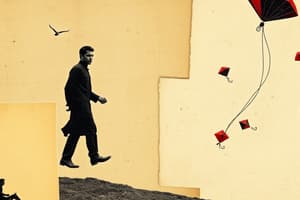Podcast
Questions and Answers
What significant time passage occurs between Chapter 9 and Chapter 10?
What significant time passage occurs between Chapter 9 and Chapter 10?
5 years have passed; Amir is now 18.
Why is trust difficult for people in Kabul according to the text?
Why is trust difficult for people in Kabul according to the text?
'You couldn't trust anyone in Kabul anymore.'
What does the description of 'grim-faced Russian soldiers [...] tanks rolling up and down the streets' suggest about Afghanistan?
What does the description of 'grim-faced Russian soldiers [...] tanks rolling up and down the streets' suggest about Afghanistan?
Afghanistan is a shadow of its former self; no more freedom.
Why are Baba and Amir escaping Afghanistan?
Why are Baba and Amir escaping Afghanistan?
Which of the following are similarities between Assef's assault and the Russian soldier's assault? (Select all that apply)
Which of the following are similarities between Assef's assault and the Russian soldier's assault? (Select all that apply)
Which of the following are differences between Assef's assault and the Russian soldier's assault? (Select all that apply)
Which of the following are differences between Assef's assault and the Russian soldier's assault? (Select all that apply)
What does the phrase 'When he stood, he eclipsed the moonlight' signify?
What does the phrase 'When he stood, he eclipsed the moonlight' signify?
What does the imagery of 'open field of grass [...] kite in the sky [...] dance [...] chatter [...] laughter [...] music' evoke?
What does the imagery of 'open field of grass [...] kite in the sky [...] dance [...] chatter [...] laughter [...] music' evoke?
What is the dark sense of irony in the phrase 'four of them...tried to fight...God...took him...bleeding down there'?
What is the dark sense of irony in the phrase 'four of them...tried to fight...God...took him...bleeding down there'?
What does 'He had withered [...] his eyes gave me a hollow look [...] shoulders hunched [...] cheeks sagged' indicate about Kamal?
What does 'He had withered [...] his eyes gave me a hollow look [...] shoulders hunched [...] cheeks sagged' indicate about Kamal?
What does Kamal's father's reaction to his son's death reveal?
What does Kamal's father's reaction to his son's death reveal?
Study Notes
March 1981
- Five years elapsed between Chapters 9 and 10; Amir is now 18 years old.
- Amir demonstrates control over his narrative by highlighting important moments through time jumps.
Trust in Kabul
- The environment is marked by a pervasive sense of distrust and betrayal.
- Reflects the oppressive atmosphere under Soviet soldiers, drawing parallels to historical oppression like Nazi Germany.
Afghanistan's Condition
- Depicted as a devastated landscape characterized by the presence of Russian soldiers, tanks, and rubble.
- A stark contrast to its past, symbolizing the loss of freedom and peace.
Reasons for Escape
- Amir and Baba are targeted for their wealth and no longer experience safety in Afghanistan.
- Lacking the life they shared with Ali and Hassan, they face severe societal changes.
- Baba's belief in American liberalism symbolizes hope for a free life in contrast to the oppressive conditions.
Assef and Russian Soldier Assaults
- Common themes include abuse of power by authority figures and the vulnerability of their victims.
- Group dynamics contribute to the normalization of violence, while Amir remains passive to protect his interests.
- Both figures misuse their positions to impose control and submission over others.
Distinctions in Assaults
- Baba actively protests against Assef's actions, while Amir does not demonstrate the same level of resistance with the Russian soldier.
- The Russian soldier lacks personal ties to either the victim or the aggressor, creating a different dynamic.
Baba's Physical Presence
- Baba’s stature is symbolized by the line about eclipsing the moonlight, showcasing his physical might.
- Despite his physical dominance, he lacks social authority in the context of the soldiers.
Semantics of Freedom
- Imagery of an open field, kites, and joyful sounds serves as a nostalgic reflection on Afghanistan's past before the invasions.
- Represents a time of innocence and liberty, now overshadowed by conflict.
Irony in Kamal's Fate
- Kamal's earlier involvement in Hassan’s assault culminates in his own tragic experience of being raped, underscoring a dark irony.
Kamal's Condition
- Kamal’s physical deterioration and eventual death illuminate the indiscriminate nature of war, affecting both the powerful and vulnerable.
- His fate highlights the harsh realities of conflict, emphasizing despair rather than resolution.
Tragic Death of Kamal's Father
- Overwhelmed by grief, Kamal's father takes his own life after the loss of his son, illustrating the impact of war on familial bonds and hope.
Studying That Suits You
Use AI to generate personalized quizzes and flashcards to suit your learning preferences.
Description
Explore key concepts and vocabulary from Chapter 10 of 'The Kite Runner'. These flashcards will help you understand the important themes, character developments, and narrative techniques used by Khaled Hosseini in this pivotal chapter.




